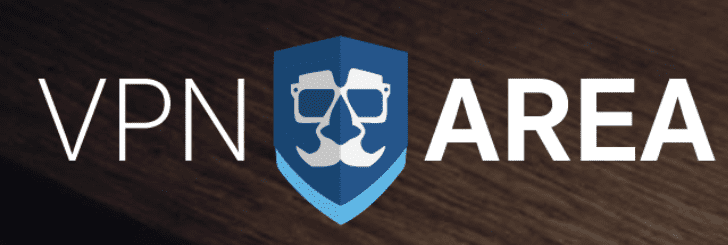VPNArea Review
VPNArea is a middle-of-the-pack VPN with a range of interesting VPN features. However, it has poor speeds and the desktop app is difficult to navigate. Read our full-length VPNArea review to learn all the details.
As of June 2024, VPNArea seems to have been discontinued. The company’s online presence has gone dark, with websites taken down and social media accounts quiet. We will update this review as the situation develops and we’re able to get more information about what’s happening. In the meantime, you can read our article looking at if VPNArea is dead.
Although VPNArea has been around since 2012, it’s barely known compared to the best VPNs on the market. In this VPNArea review, we put this Bulgaria-based VPN through its paces to find out if it has the features and performance to be considered a premium VPN.
Key Takeaways:
- VPNArea is an average VPN provider with a few useful features, including a kill switch and an ad blocker.
- The VPN’s apps are not easy on the eyes, and they are hard to use.
- It has slow upload and download speeds and latency tends to be high.
- VPNArea has a strict no-logs policy and has no record of breaches.
As we do in all our other VPN reviews, we’ll check VPNArea based on the following categories: features, pricing, usability, speed, server location, streaming performance and customer support. Stick around as we give you the lowdown on this VPN provider.
-
10/10/2022 Facts checked
Updated review with new information and test results.
-
06/26/2024 Facts checked
Added note about VPNArea being seemingly discontinued.
Alternatives for VPNArea
- 1
- : PayPal, Credit card, Google Pay, JCB, UnionPay, Bitcoin, Ethereum, X-Coin
- : 10
- :
- :
- :
- :
Average speedDownload Speed88 MbpsUpload Speed9 MbpsLatency4 ms - 2
- : PayPal, Credit card, Google Pay, Amazon Pay
- : Unlimited
- :
- :
- :
- :
Average speedDownload Speed93 MbpsUpload Speed9 MbpsLatency3 ms - 3
- : PayPal, Credit card, Bitcoin, UnionPay, iDeal, Sofort, Giropay, Pixpay, Sepa Direct Debit
- : 8
- :
- :
- :
- :
Average speedDownload Speed90 MbpsUpload Speed9 MbpsLatency3 ms - 4
- : PayPal, Credit card, Amazon, Paygarden, Apple Pay, Google Pay
- : Unlimited
- :
- :
- :
- :
Average speedDownload Speed67 MbpsUpload Speed9 MbpsLatency114 ms - 5
- : PayPal, Credit card, bitcoin, Amazon Pay
- : 7
- :
- :
- :
- :
Average speed
VPNArea Review: Strengths & Weaknesses
Pros:
- Budget-friendly
- Strict no-logs policy
- Dedicated IP address
- Cryptocurrency option
Cons:
- Finicky user interface
- Slow speeds
Features
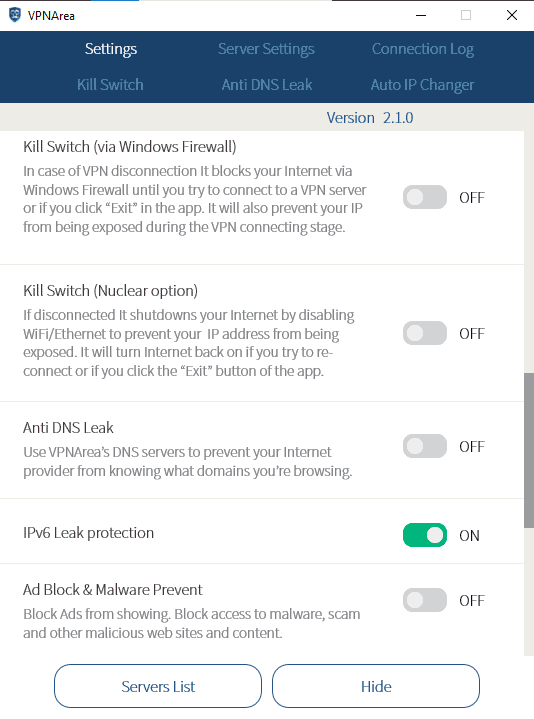
VPNArea is not the most feature-packed VPN we’ve reviewed, although there are a few useful VPN features. There’s a kill switch feature, which cuts off your internet connection when your VPN connection drops. The anti-DNS leak feature allows you to use VPNArea’s DNS servers to block your internet service provider from seeing your internet traffic.
Protect Your Privacy. Get Our Free VPN Guide Now!
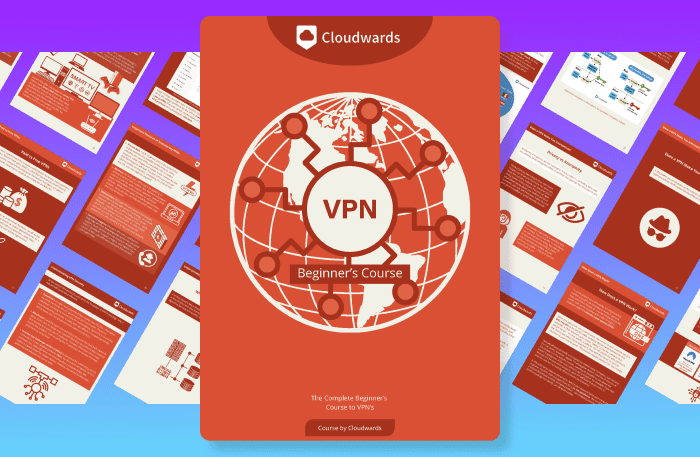
- Comprehend the essential role a VPN plays in safeguarding your digital life
- Gain a deep understanding of how VPNs function under the hood
- Develop the ability to distinguish fact from fiction in VPN promotions
The VPN also has an ad blocking and malware protection feature, which is useful if you want to ward off ads and block content from malicious websites.
Custom DNS servers
VPNArea allows you to choose your own DNS servers. This is a useful option if you want to use a specific DNS to protect your online activity on, say Google, Cloudflare, or Quad9 DNS systems. Note that when you turn on the custom DNS option, the ad block and anti-DNS leak will automatically turn off.
Dedicated IP Address
If you’re worried about the issues that can come with shared IP addresses, such as being blocked and tracking, opt for VPNArea’s dedicated IP service. With this service, VPNArea will assign a unique IP address to you that you can use every time you connect to the internet. Dedicated IP addresses are especially helpful for sensitive online activities like banking.
Of course, the dedicated IP address comes at an extra cost, but you also get a private VPN server just for your own use, alongside the dedicated IP. Read our CyberGhost review and PIA review for other VPNs that offer this paid add-on.
Specialty Servers
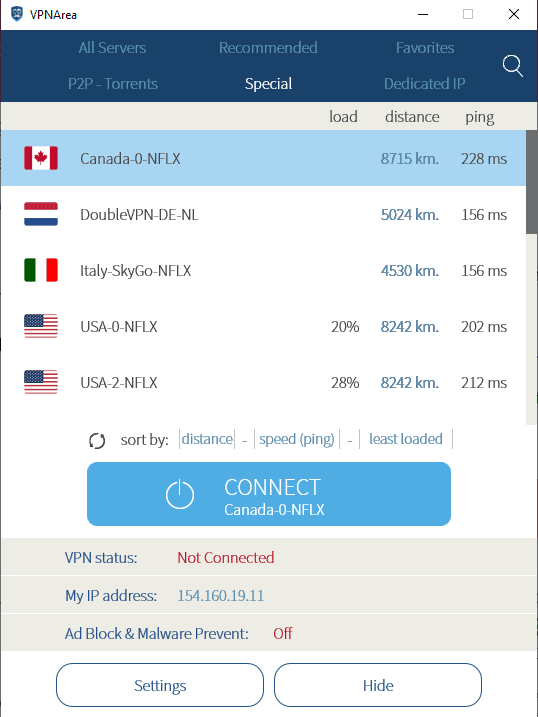
VPNArea has numerous servers dedicated to streaming. Each dedicated streaming server has an inscription on the server, indicating which service it can stream. For instance, servers dedicated to streaming Netflix have “NFLX” on them. Additionally, the VPN has servers labeled P2P, which are dedicated to torrenting.
That said, more capable VPNs, like ExpressVPN, optimize their entire networks for streaming and torrenting, and this is an approach we’d like to see all VPNs take in the future. See our ExpressVPN review to learn more.
VPNArea Features Overview
| Features | |
|---|---|
| Payment methods | PayPal, Credit card |
| Accepts cryptocurrency | |
| Simultaneous connections | 8 |
| Supports split tunneling | |
| Unlimited bandwidth | |
| Free trial available | |
| Refund period | |
| Worldwide server amount | 100 locations in 52 countries |
| Desktop OSes | Windows, MacOS, Linux |
| Mobile OSes | Android, iOS |
| Browser extensions | |
| Can be installed on routers | |
| Can access Netflix US | |
| Can access BBC iPlayer | |
| Can access Hulu | |
| Can access Amazon Prime Video | |
| Encryption types | 256-AES |
| VPN protocols available | OpenVPN, IKEv2 |
| Enabled at device startup | |
| Allows torrenting | |
| No-logging policy | |
| Passed DNS leak test | |
| Killswitch available | |
| Malware/ad blocker included | |
| Live Chat | 24/7 |
| Email support | 24/7 |
| Phone support | |
| User forum | |
| Knowledgebase |
Pricing
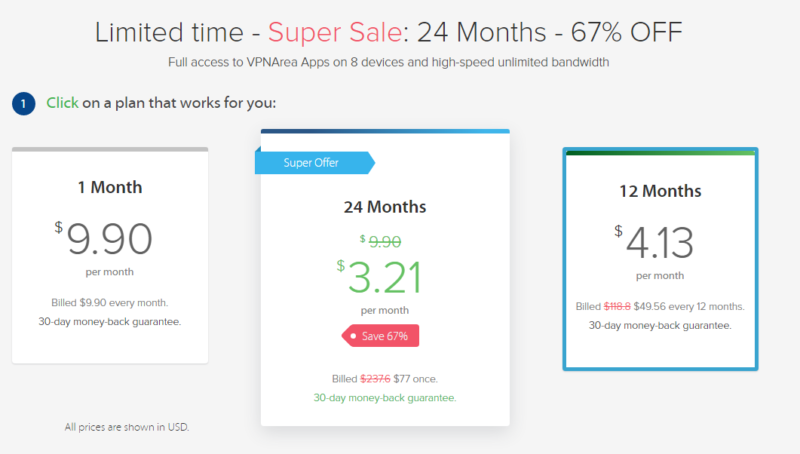
VPNArea has three pricing plans: a monthly, yearly and two-year plan. The monthly plan is billed at $9.90 per month. This monthly charge is cheaper than that of many VPNs we’ve reviewed, but mere pricing is not enough to decide on a VPN. You’ll have to compare features and performance.
VPNArea’s yearly plan costs $4.13 per month — a total of $49.56. The VPN’s heavily discounted deal is the two-year plan, which is billed at $3.21 per month. VPNArea’s plans are relatively budget-friendly, but there are many VPN providers that offer more features at even better prices, such as NordVPN, one of the fastest VPNs.
In fact, NordVPN is our top pick overall. Check out our NordVPN review for more details on why we like it.
As mentioned earlier, VPNArea offers a dedicated IP address feature. On the one-year plan, expect to pay between $20 and $44 for a dedicated IP. If you want a dedicated IP for three years, you’ll need to pay between $60 and $132.
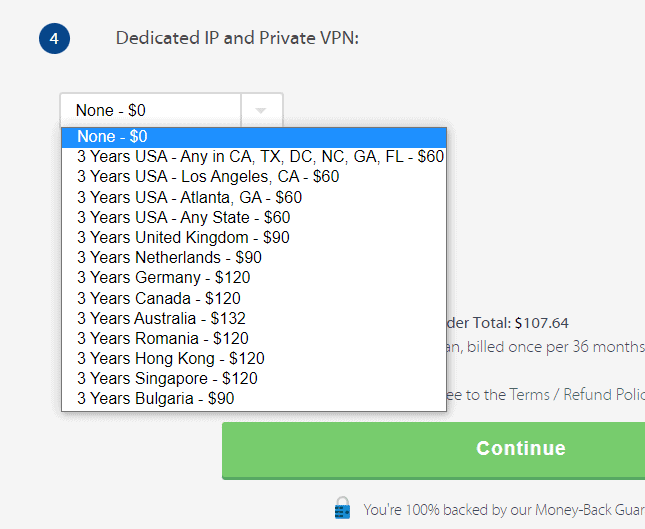
All of VPNArea’s plans come with a 30-day money-back guarantee. This means that you’re entitled to a full refund as long as you request it within 30 days of signing up. What’s more, each plan allows you to connect up to eight devices at once.
Note that VPNArea offers different plans and pricing depending on your location. For instance, the VPN offers a two-year plan for users in Africa, which is not available for those in the U.S.
- Unlimited GB
- 6
- Yes
- Unlimited GB
- 6
- Yes
- Unlimited GB
- 6
- Yes
Payment Options
VPNArea accepts payments through a wide range of platforms. You can pay with credit cards, including Visa and Mastercard, and there’s the option to pay through PayPal and AliPay.
It was curious that the VPN doesn’t seem to allow payments from certain countries, including Ghana and Nigeria. We had to resort to paying from the U.S. before accessing the VPN service. Be sure to check out if the VPN supports payments from your country.
If you want to remain anonymous, you can use Bitcoin, Litecoin, Bitcoin Cash and Dogecoin. Not all VPNs offer cryptocurrency payment options, so this is good to see. Read our best VPNs for crypto article to discover other VPN services that offer crypto payments.
Ease of Use
VPNArea has apps for all the major desktop and mobile operating systems, including Windows, Linux, macOS, Android and iOS. You can also install it on routers that support the OpenVPN protocol. However, the VPN doesn’t have clients for any browser extension.
For this review, we tested the VPN’s usability on Windows and Android.
Desktop App
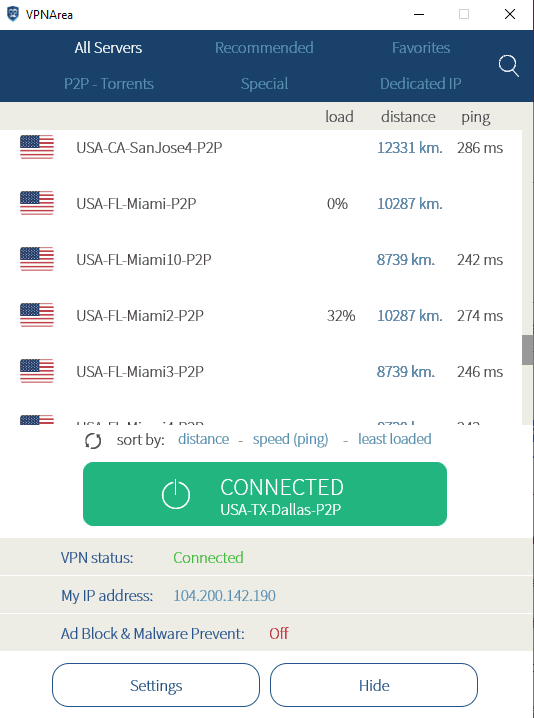
VPNArea’s Windows client could use some upgrades. First of all, the app is not aesthetically pleasing and has the feel of an app from the ’90s.
What’s more, the app is organized strangely, which can make navigation difficult. For instance, on the homepage, the power button doesn’t take center stage, as is the case with most of our beginner-friendly VPNs. Rather, the homepage is busy with lots of information about servers and your connection status.
That said, VPNArea makes it easy for users to choose the best servers by showing the load, distance and ping of each server. You can also sort out the servers based on distance, speed and current load.
The top part of the app contains buttons to help you choose specific servers, including P2P and dedicated IP servers. At the bottom of the homepage, you’ll find the settings tab, which houses buttons for startup preferences, kill switch, anti-DNS leak, protocols and ad/malware blocker.
Mobile App
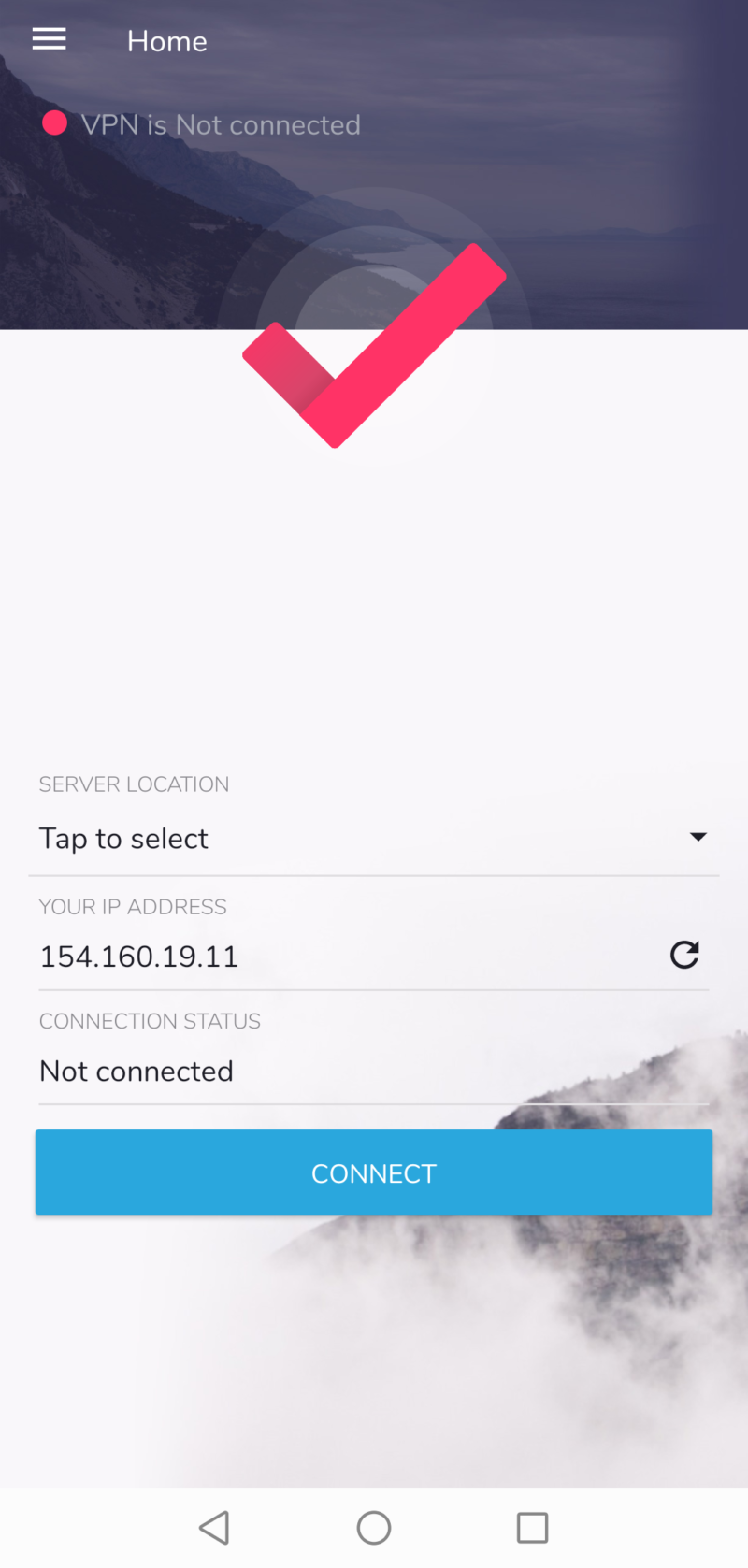
VPNArea’s Android app is more attractive and easier on the eye than the desktop app. On the homepage, you’ll find a large power button that allows you to automatically connect to the best server depending on your location. The homepage shows your IP address as well as your connection status. There’s also a button that reveals all of VPNArea’s server locations.
At the top-left of the app, you’ll see a hamburger icon. Clicking on it will reveal buttons for servers, settings, connection logs and the support center. The server section contains all of the VPN’s servers and you can do a quick speed test of each server before connecting. Under settings, you can opt to use VPNArea’s DNS servers, change your protocol and select a port.
Speed
Because they encrypt and reroute your traffic, all VPNs will reduce your internet speeds to an extent. However, the fastest VPNs have a marginal impact on your internet speeds. That way, you can browse the internet, watch high-definition videos and play games without experiencing lags. That’s why we test VPN speeds in all our reviews.
How We Ran Our VPNArea Speed Test
We conducted our VPNArea speed test from Portland, Oregon, with an unprotected download speed of 21.24 Mbps, upload speed of 39.08 Mbps and a latency of 213 ms. These were our benchmark values to help us gauge VPNArea’s impact on internet speed.
We connected to at least one server location on each continent to see how the VPN performs across the board. We’ve summarized our results in the table below.
Note that your actual VPN speeds will differ depending on a variety of factors, including location and internet speeds. However, the values shown below are useful indicators of how VPN performs in terms of speeds.
VPNArea Speed Test Results
| Location | Ping ms | Download Mbps | Upload Mbps |
|---|---|---|---|
| Unprotected | 18 | 38.03 | 5.92 |
| United States | 30 | 34.65 | 5.71 |
| United Kingdom | 295 | 17.52 | 5.65 |
| Brazil | 387 | 17.81 | 3.80 |
| Singapore | 414 | 8.67 | 5.28 |
| South Africa | 680 | 4.38 | 5.19 |
| Australia | 307 | 13.91 | 4.86 |
| Average | 352 | 16.16 | 5.08 |
Clearly, VPNArea is not anywhere close to the fastest VPNs on the market. Our best speeds came from the United States, and that was no surprise because it was the closest to our testing location. Our download speeds in the U.K. and Brazil were halved, and everywhere else performed even worse.
As expected, faraway locations like South Africa and Singapore had high latency and relatively poor download and upload speeds. Learn more about latency in our speed vs latency guide.
VPNArea’s latency was also pretty high, except in the United States, which was closest to our testing location. This trend means that VPNArea might not be a good choice for gaming unless you have a server very close by.
Another concern we had while testing VPNArea for speeds was that some of the servers, including several servers in Brazil, the U.S., and South Africa, simply wouldn’t connect, even after several tries.
We recommend you peruse our fastest VPN guide to find a VPN that boasts excellent download speeds, and upload speeds while handling latency well.
Security
The caliber of security you get with a VPN depends largely on the encryption and protocols it offers.
VPNArea comes with AES-256 encryption, which is virtually unbreakable. Our article on AES encryption explains that further. It’s worth noting that the VPN pairs this encryption standard with all its protocols.
VPNArea offers two protocols. First is the OpenVPN protocol, which provides an excellent combination of speed and security. Next is the IKEv2 protocol, which is best for mobile devices. Sadly, there is no support for the more modern WireGuard protocol yet. You can learn more about these protocols in our guide to VPN protocols.
Privacy
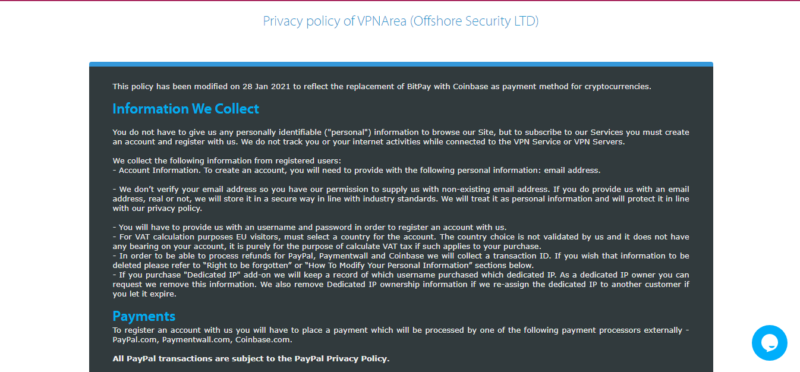
VPNArea makes it clear in its privacy policy that it’s a no-logs VPN and doesn’t monitor, record or store any identifiable customer information. This includes login dates, DNS requests, timestamps, incoming and outgoing IP addresses and bandwidth statistics.
However, the VPN needs your email address to create an account. Since the VPN doesn’t verify the email supplied, you can use a dummy or fake email address. You’ll need to create a username and password for your account, though.
Who Owns VPNArea?
VPNArea is owned by Offshore Security Limited. Very little is known about this company, but secrecy seems like the order of the day in the VPN world anyway. That said, the company is located in Bulgaria and is compliant with the European Union’s General Data Protection Regulation (GDPR).
Additionally, Offshore Security Limited’s company servers are based in Switzerland, so your personal information will be processed under Switzerland’s data protection and privacy regulations. As you can see in our post on Swiss privacy laws, Switzerland is a privacy-friendly jurisdiction. It’s little wonder that some VPNs, including Proton VPN, make their abode there (read our Proton VPN review).
Streaming Performance
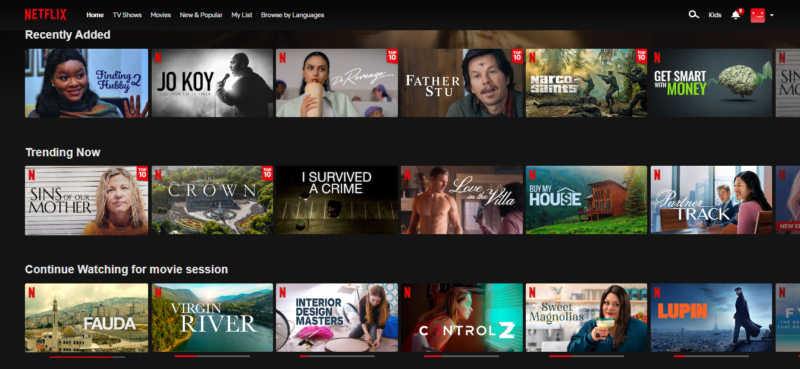
VPNArea has dedicated servers for streaming from a wide range of services, including Netflix, HBO and Hulu. In our experience, the VPN was able to unblock Netflix libraries in the U.S., U.K., Canada and Italy with relative ease.
Further, we were able to unblock various streaming services, including Amazon Prime Video, Hulu and HBO, but unblocking BBC iPlayer was tricky. It took several tries before we got in. For Disney Plus, we could not get in no matter how hard we tried.
Fortunately, we were able to stream HD movies on Netflix, Amazon Prime Video and Hulu without any noticeable lags or hitches.
| Netflix | |
| Amazon Prime Video | |
| Max | |
| Hulu | |
| Disney Plus | |
| BBC iPlayer |
Server Locations
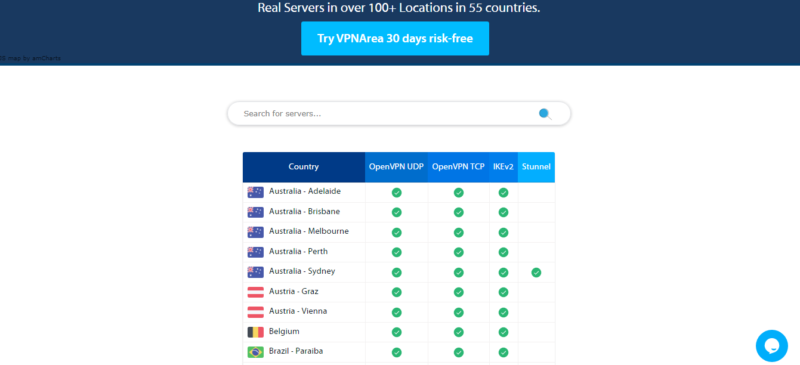
VPNArea has VPN servers in 52 countries and over 100 locations. Considering that the VPN has been around since 2012, this server count is not very impressive. For instance, Surfshark, which started operating in 2018, has over 3,200 VPN servers in over 99 countries — read our Surfshark review for the whole list.
It’s worth noting that the VPN doesn’t offer any virtual servers to augment its server count, a practice common among VPNs. Read our comparison of virtual and physical servers to understand more about these kinds of servers.
We’ve broken down VPNArea’s VPN server network in the table below.
| Regions: | Countries | Locations |
|---|---|---|
| North America | 3 | 16 |
| South America | 3 | 4 |
| Europe | 34 | 45 |
| Asia | 9 | 9 |
| Africa | 1 | 2 |
| Oceania | 2 | 6 |
| Middle East | 0 | 0 |
As you can see from the table, VPNArea has most of its servers in Europe. Although most European countries have only one server location, the VPN service has multiple servers in popular European destinations, including Germany, Portugal, Russia, France, Italy, the Netherlands and the U.K.
The VPN also has many servers in North America, with four VPN server locations in Canada and 11 in the U.S.
Beyond that, VPNArea offers slim pickings in other continents. Typically, underserved locations, including Africa and Oceania, have only one and two server locations, respectively, while the Middle East has none.
Customer Service
VPNArea has a knowledgebase, although it’s only available to paying users. In the knowledgebase, you’ll find articles, installation guides, FAQ and troubleshooting guides. That said, the entries are not always detailed and could do with some screenshots and video tutorials.
If you have a technical problem, you can contact VPNArea’s customer support through email. There’s also a ticketing system that you can access by signing in to your account. The VPN doesn’t have a community forum or phone support, except for handling legal matters. Of course, the fastest way to reach support is through live chat.
Live Chat Support
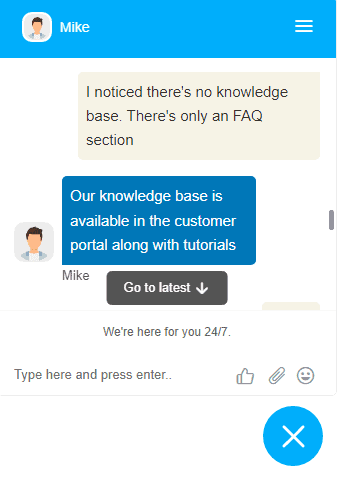
In our experience, we found VPNArea’s customer support agents responsive and friendly. We connected to a live agent in seconds and the person was patient throughout. We prodded agents with a collection of simple and technical questions and we received prompt and helpful answers.
The Verdict
Overall, VPNArea is a useful VPN with basic and interesting features, including a kill switch, custom DNS option, dedicated IP and an ad blocker. It also has a strict no-logs policy and no record of data breaches. The price is also affordable, though it’s not the cheapest VPN out there.
However, there are some challenges with the VPN. First, it has a complicated user interface, making it less than ideal for new VPN users. Moreover, the VPN has slow upload and download speeds and its latency tends to be high.
Have you used VPNArea before? What did you enjoy or dislike about using the app? Do you agree with our observations about VPNArea in this review? Share your thoughts and comments with us below. As always, thanks for reading.
FAQ
VPNArea has apps for all major operating systems, including Windows, macOS, Linux, Android and iOS.
VPNArea is a secure VPN service that uses military-grade AES-256 encryption and a variety of protocols, including OpenVPN and IKEv2.
VPNArea offers the OpenVPN protocol, which is the gold standard among VPNs. There’s also the IKEv2 protocol, which is best for mobile devices.

